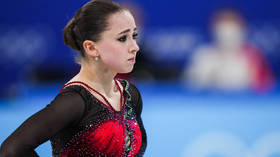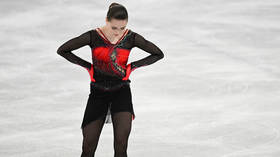Sports court condemns anti-doping officials over Valieva test delay

World anti-doping officials have been criticized in their handling of Kamila Valieva’s case, with a panel from the Court of Arbitration for Sport (CAS) saying there were legitimate concerns regarding delays with the results of a sample provided by the Russian figure skater.
Valieva suffered Olympic agony on Thursday as the 15-year-old missed out on a medal in the women’s individual competition in Beijing.
Hours after the event, the CAS panel which had cleared Valieva to continue her participation in the Chinese capital issued its full reasoning in her case.
CAS noted the contentious delay surrounding Valieva’s positive test for the banned heart medication trimetazidine. Her sample was taken in December but the result was only reported on February 8 after being analyzed at a laboratory in Stockholm accredited by the World Anti-Doping Agency (WADA).
Along with the International Olympic Committee (IOC) and International Skating Union (ISU), WADA had been seeking to ban Valieva from further participation in Beijing.
The anti-doping organization had argued that international standards only recommend that samples be processed with 20 days, rather than that being a cast-iron rule.
“The Panel finds this submission to not be compelling,” read the CAS judgement, dismissing that reasoning.
“On the contrary, it is rather worrying to hear such a submission when athletes are held to a high standard in meeting their anti-doping obligations and at the same time, the anti-doping authorities are subject to mere recommendations on time deadlines that are designed to protect athletes from late- or inconveniently-arising claims.
“Although all athletes’ samples are anonymous, it should be possible for anti-doping laboratories and authorities to handle anti-doping tests in a swift manner when the samples are collected at significant pre-events that may constitute selection events for the Olympic Games, such as the Russian National Championships in figure skating,” it added.
Throughout Valieva’s case, WADA has sought to shift the blame to the Russian Anti-Doping Agency (RUSADA) for supposedly not labeling Valieva’s sample as “high priority.” The Stockholm lab in question is also said to have been affected by Covid-related issues and staff illness.
But the CAS panel was scathing in its assessment of WADA’s arguments.
“Put simply, athletes should not be subject to the risk of serious harm occasioned by anti-doping authorities’ failure to function effectively at a high level of performance and in a manner designed to protect the integrity of the operation of the Games,” read the judgement.
The 41-page document released on Friday also notes that Valieva, “through no fault of hers, and without any allegation of improper conduct of anyone... finds herself at the Olympic Winter Games being put on notice of an alleged ADRV [anti-doping rule violation] from a sample taken 44 days prior.”
In explaining its decision to decline a suspension, the three-person CAS panel noted Valieva’s status as a minor and therefore a ‘protected person’ – something which those seeking to reimpose the ban had questioned was relevant.
The document confirmed that Valieva’s team provided evidence that she had repeatedly tested negative in doping probes conducted from August 2019 to February 2022 – including a sample taken at the Beijing Games.
Valieva’s team also presented arguments from experts that “intake [of trimetazidine] through contamination is possible, and traces can be found in samples even if somebody in the athlete’s environment uses this medication and this could happen through contaminated objects.”
It has been suggested that Valieva may have tested positive via contamination from heart medication being taken by her grandfather.
The investigation will continue into the case, including probes by RUSADA and WADA into Valieva’s entourage.
While Valieva has already missed out on an individual medal in Beijing, the status of the medals in the figure skating team event, where she helped the Russian team win gold, is yet to be resolved.














